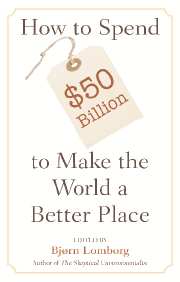Book contents
- Frontmatter
- Contents
- Contributors
- Introduction
- 1 Meeting the Challenge of Global Warming
- CLIMATE CHANGE – OPPONENTS' VIEWS
- 2 Communicable Diseases
- COMMUNICABLE DISEASES – OPPONENTS' VIEWS
- 3 The Challenge of Reducing the Global Incidence of Civil War
- THE CHALLENGE OF CONFLICTS – OPPONENTS' VIEWS
- 4 Toward a New Consensus for Addressing the Global Challenge of the Lack of Education
- THE CHALLENGE OF LACK OF EDUCATION – OPPONENTS' VIEWS
- 5 The Challenge of Poor Governance and Corruption
- THE CHALLENGE OF POOR GOVERNANCE AND CORRUPTION – OPPONENTS' VIEWS
- 6 Hunger and Malnutrition
- HUNGER AND MALNUTRITION – OPPONENTS' VIEWS
- 7 Population and Migration
- POPULATION: MIGRATION – OPPONENTS' VIEWS
- 8 The Water Challenge
- THE WATER CHALLENGE – OPPONENTS' VIEWS
- 9 Subsidies and Trade Barriers
- SUBSIDIES AND TRADE BARRIERS – OPPONENTS' VIEWS
- Expert Panel Ranking
- Index
7 - Population and Migration
Published online by Cambridge University Press: 27 July 2009
- Frontmatter
- Contents
- Contributors
- Introduction
- 1 Meeting the Challenge of Global Warming
- CLIMATE CHANGE – OPPONENTS' VIEWS
- 2 Communicable Diseases
- COMMUNICABLE DISEASES – OPPONENTS' VIEWS
- 3 The Challenge of Reducing the Global Incidence of Civil War
- THE CHALLENGE OF CONFLICTS – OPPONENTS' VIEWS
- 4 Toward a New Consensus for Addressing the Global Challenge of the Lack of Education
- THE CHALLENGE OF LACK OF EDUCATION – OPPONENTS' VIEWS
- 5 The Challenge of Poor Governance and Corruption
- THE CHALLENGE OF POOR GOVERNANCE AND CORRUPTION – OPPONENTS' VIEWS
- 6 Hunger and Malnutrition
- HUNGER AND MALNUTRITION – OPPONENTS' VIEWS
- 7 Population and Migration
- POPULATION: MIGRATION – OPPONENTS' VIEWS
- 8 The Water Challenge
- THE WATER CHALLENGE – OPPONENTS' VIEWS
- 9 Subsidies and Trade Barriers
- SUBSIDIES AND TRADE BARRIERS – OPPONENTS' VIEWS
- Expert Panel Ranking
- Index
Summary
Description of the challenge
For most of human history, migration has been constrained by physical barriers and transport difficulties rather than government action. More recently, sharply different rates of population and economic growth across the world have combined to make many workers from poorer countries eager to move to countries where more jobs are available and wages are much higher. Modern communications make the differences even more visible, and modern transport makes migration easy and affordable. But migrants are not always welcome in rich countries.
In an ideal world, such economically motivated migration would benefit migrants, increase global GDP and promote economic convergence between rich and poor countries. After a time, this would reduce the pressure to migrate. The challenge addressed in this chapter is ensuring that the migration that occurs promotes equality.
Global economic convergence is a goal supported by most economists and other commentators. However, there is no consensus on how migration might achieve this, with strong arguments being made both for and against.
In 2000, it was estimated that 175 million people – 3% of the global population – were migrants who had lived outside their country of birth or citizenship for a year or more. This number had doubled in the previous 25 years, during which the world's population grew by 50%. Most migrants move from poorer to richer countries, with about 60% of the total now living in the more developed countries.
- Type
- Chapter
- Information
- How to Spend $50 Billion to Make the World a Better Place , pp. 113 - 124Publisher: Cambridge University PressPrint publication year: 2006



